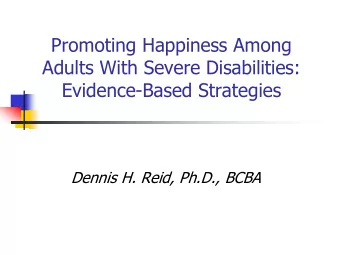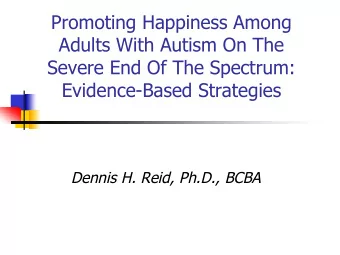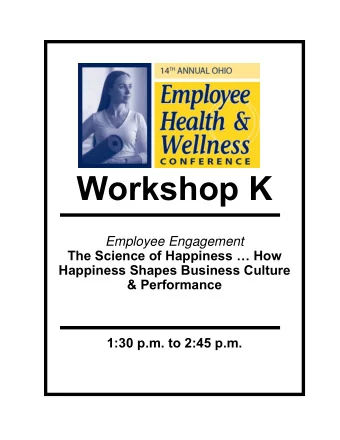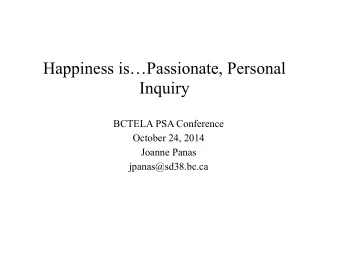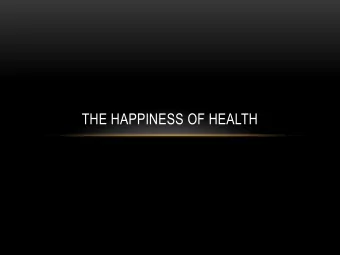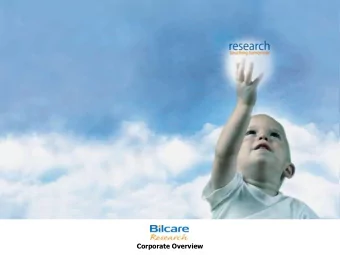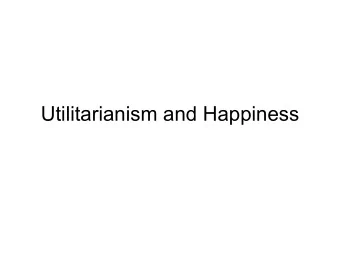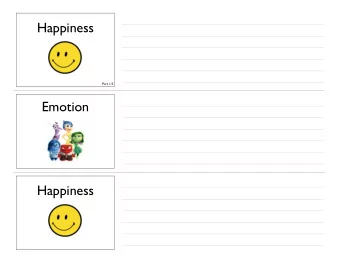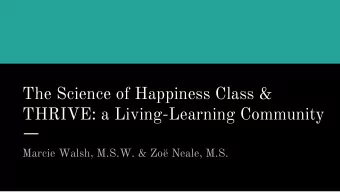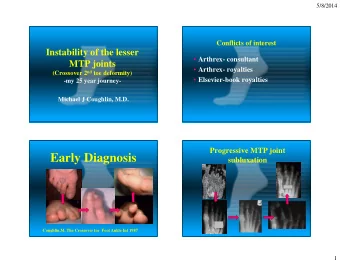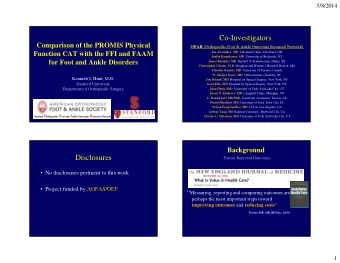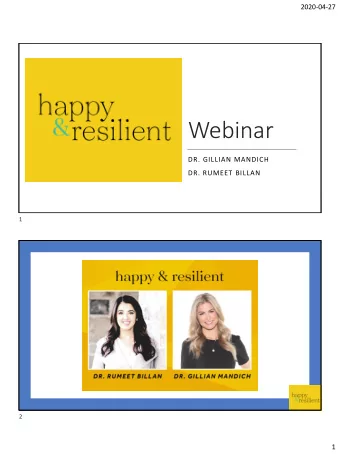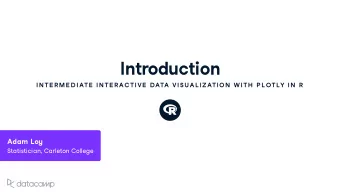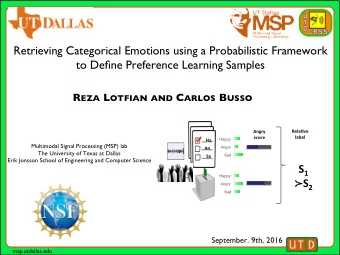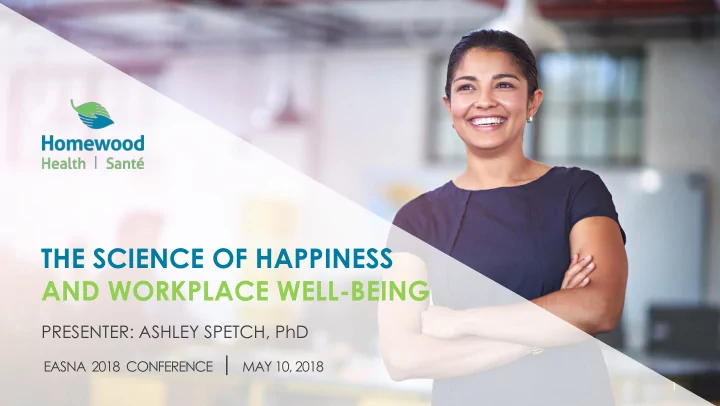
THE SCIENCE OF HAPPINESS AND WORKPLACE WELL-BEING PRESENTER: ASHLEY - PowerPoint PPT Presentation
THE SCIENCE OF HAPPINESS AND WORKPLACE WELL-BEING PRESENTER: ASHLEY SPETCH, PhD EASNA 2018 CONFERENCE | MAY 10, 2018 1 OBJECTIVES Develop a deeper understanding of happiness as a component of psychological health Raise awareness about
THE SCIENCE OF HAPPINESS AND WORKPLACE WELL-BEING PRESENTER: ASHLEY SPETCH, PhD EASNA 2018 CONFERENCE | MAY 10, 2018 1
OBJECTIVES • Develop a deeper understanding of happiness as a component of psychological health • Raise awareness about the benefits of happiness and well-being in the workplace • Highlight recent research on clinical implications of happiness 2
CONTINUUM OF MENTAL HEALTH Maximum Mental Well-Being Maximum Minimum Mental Health Mental Health Problems Problems Minimum Mental Well-Being 3
WHAT IS HAPPINESS? Scientists define happiness based on • two components: 1. Positive emotions (frequency more so than intensity) 2. Life satisfaction Known collectively as “subjective • well- being” 4
WHAT MAKES US HAPPY? 5
WHAT MAKES US HAPPY? Intentional Activities 40% Genetics 50% Circumstances 10% 6
HOW LIFE CIRCUMSTANCES IMPACT HAPPINESS • Circumstances only account for 10% of our happiness Why do circumstances have such little impact on our happiness? 7
HOW LIFE CIRCUMSTANCES IMPACT HAPPINESS • Circumstances only account for 10% of our happiness Why do circumstances have such little impact on our happiness? HEDONIC ADAPTATION 8
HAPPINESS THROUGH INTENTIONAL ACTIVITIES Accounts for 40% of our happiness • Within our ability to change • regardless of circumstances or our happiness set-point Small changes can have • a large impact 9
WHAT DO HAPPY PEOPLE LOOK LIKE What are some of the characteristics and behaviours of genuinely happy people? Are able to “live in the moment” and savour life’s everyday • pleasures Imagine a hopeful future • Offer their help to others • Devote their time to nurturing relationships with family & friends • Cope well with life’s challenges • Have a strong sense of purpose & meaning • Make a regular commitment to self-care • 10
Is happiness beneficial for anything other than making us feel good? 11
BENEFITS OF HAPPINESS Resilience in the face of challenges • Bounce back from negative events and emotions • Being well-liked by others • Rich networks of social support • Strong immune systems • Physical health • Longer life expectancy • Career success • Higher engagement at work • Stronger self-esteem and self-confidence • 12
BENEFITS OF HAPPINESS Happiness can lead to better outcomes Causal Effects Group Induce differences positive in behaviour paralleling emotions success 13
WHY IS HAPPINESS IMPORTANT AT WORK Positive emotions at work are associated with: Increased creativity, proactivity, collaboration, • task performance, commitment, engagement, customer satisfaction/loyalty, profitability, efficiency, organizational citizenship behaviour Decreased absence, interpersonal conflict, turnover • 14
Individual Actions to Increase Happiness at Work 15
HOW DO WE INCREASE OUR HAPPINESS? By focusing on the following research-based intentional activities: 1. Expressing gratitude 2. Practicing optimism 3. Avoiding overthinking and social comparison 4. Performing acts of kindness 5. Nurturing relationships 6. Savouring positive experiences 7. Achieving optimal engagement 8. Practicing self-care 16
INCREASING HAPPINESS = LEARNING A NEW SKILL Do you want to become happier? What does it take? Make a commitment • Put in effort • Repeated practice • Finding the “right” (best -fitting) activities • Being open to completing activities • 17
Organizational Actions to Increase Happiness at Work 18
WHAT CAN ORGANIZATIONS DO? Promote good Demonstrate Involve and emotional well-being/ engage the Create and physical happiness workforce opportunities health Promote for social organizational connections virtuousness Create an Recognition atmosphere of growth Balance needs of individual Give and employees Positive organization appropriate communication Smart control selection 19
Organizational Implications of Happiness 20
Clinical Implications of Happiness 21
RECENT CLINICAL RESEARCH Broad shift in psychology to examine the positive • Extant research has been in community/university sample • Recent research suggests that positive emotions and optimism • facilitate clinical improvement Future direction for further research to target the positive systems • more Academic research is starting to substantiate things we are already • doing in EAP! 22
KEYS TAKEAWAYS 1. Lasting happiness requires commitment, effort & motivation 2. Person-activity fit means choosing the best activities for you 3. ROI for workplace climate that encourages well-being 4. Well-being is both an outcome and predictor of mental health 5. Small actions can have big effects HAPPINESS IS UNDER YOUR CONTROL; ORGANIZATIONS, LEADERS, and CLINICIANS can influence! 23
QUESTIONS OR THOUGHTS? PRESENTER: ASHLEY SPETCH, PHD 24
25
Recommend
More recommend
Explore More Topics
Stay informed with curated content and fresh updates.


